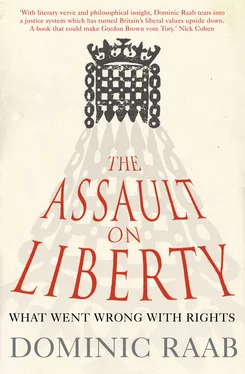The second relevance of Magna Carta to the modern debate on rights lies in its constitutional character. Replete with quid pro quos, it is premised on the coupling of rights with responsibilities, balancing the interests of the king and his subjects. Magna Carta was framed as a social bargain, explicitly designed as a contract between the king and the barons – ruler and ruled – requiring reciprocal respect. The conception of liberty, or more accurately certain specifically defined liberties, was spelt out through a series of rights that sought predominantly to check the overwhelming or arbitrary exercise of power by the monarch. The barons intended to restrain the meddling of the king in their affairs, and Magna Carta’s overarching aim was to protect their freedom from the Crown, rather than obliging the monarch to do anything in particular for them.
Magna Carta represented a compromise of competing interests, rather than any coherent blueprint for liberal democracy. According to Churchill, the barons ‘groped in the dim light towards a fundamental principle’, which they found in the ‘only half understood’ idea that ‘Government must henceforward mean something more than the arbitrary rule of any man, and custom and the law must stand even above the King.’ Those early freedoms from royal interference subsequently developed into a range of fundamental liberties demarcating the state’s ability to interfere in the lives of its citizens – including freedom from arbitrary arrest and prolonged detention without charge – and outlined the broader contours that would define the relationship between the citizen and the state. Rooted in our history, this basic idea of placing checks on the power of the state, thereby preserving the freedoms of the citizen from interference, are at the heart of the current debates on the limits of state surveillance, the reach of database state, the right of the police to take and retain DNA on innocent people and safeguards on the use of the ever-present coverage provided by CCTV cameras.
The initial constitutional cast set by Magna Carta developed piecemeal, over the following eight centuries, into a model of liberal democracy. Unlike many other countries, Britain’s constitution is not codified in a single overriding document, but made up of a patchwork of laws and conventions that have developed steadily over time. The Petition of Right in 1628 added constitutional bars on taxation without the consent of Parliament and the use of martial law in peacetime. Inspired by Sir Edward Coke – who held the posts of Attorney General and Chief Justice before standing for Parliament – the Petition of Right also provided the earliest protection of individual privacy. Coke’s famous maxim that ‘a man’s house is his castle’ informed the drafting of Article VI, which protected private homes from being forced by the Crown to house soldiers, a longstanding grievance. This established one of the first legal protections against intrusions into the home, on which later common law privacy protections were incrementally built.
Today, we expect that the sanctity of the home will only be breached in the most exceptional of situations warranted by the strict necessity of law enforcement or public safety – not on the whim of some civil servant, quango or local official. Similarly, we expect the state to respect the privacy of our correspondence, internet access and email exchanges, unless there are strong security grounds for interception or monitoring. We recognize the need for the state to gather some information on us, but only on a limited – need-to-know – basis, in order to help fight serious crime and terrorism. Few are comfortable with the idea of giving the state carte blanche to collect, retain and share our detailed, personal and sensitive information. The state is meant to be accountable to the citizen, not the reverse.
Like Magna Carta, the Bill of Rights, passed in 1689 in the aftermath of Civil War and the Glorious Revolution, was another straightforward, unpretentious text addressing in clear and concise terms a catalogue of widespread grievances. A dozen constitutional gripes were followed by thirteen general remedies, as well as redress for particular issues of contemporary concern. The Bill of Rights built on earlier rights. Fair trial safeguards were added, strengthening the independence of jury selection from bias, and requiring the prior conviction of a criminal offence before the imposition of fines or the forfeiture of property. Article 20 of Magna Carta had stipulated that ‘For a trivial offence, a free man shall be fined only in proportion to the degree of his offence, and for a serious offence correspondingly, but not so heavily as to deprive him of his livelihood’. The underlying idea was that criminals should get their just deserts, pay the price for their offence, but that the punishment should fit the crime. There must be a limit on the right of the ruler to punish those subject to his rule. The Bill of Rights added to this the requirement that ‘excessive bail ought not to be required, nor excessive fines imposed…’. These early constitutional innovations marked out the British idea of justice as firm but fair. Today, debates about crime and punishment still focus on these basic ideas, whether it is the debate about honesty in sentencing or consideration of the proportionality of criminal punishments.
The same clause of the Bill of Rights added a ban on the infliction of ‘cruel and unusual punishments’, an early precursor to the modern ban on torture. Today, the legal standards applied in the UK, European and UN human rights law developed from this early definition, set out more than three hundred years ago. Students, journalists, political activists and others challenge or protest against the government, confident that they will not be persecuted for their views or political activities, as they are elsewhere. There would be widespread outrage in this country if the state engaged in the kinds of murder or torture of its citizens that take place in many other parts of the world – including Russia, Iran and Sudan. Allegations of torture by British troops in combat are investigated seriously, and UK cooperation with foreign agencies accused of practising torture attracts intense scrutiny.
The Bill of Rights also contains one of the earliest guarantees of freedom of speech, declaring that ‘the freedom of speech, and debates or proceedings in parliament, ought not to be impeached or questioned in any court or place out of parliament’. The freedom to think and say what we like, without inciting violence or harming others, is fundamental to the idea of liberty in this country. This right – and the related freedoms of worship, conscience and peaceful protest – developed from the early struggle for religious freedom during the Reformation into the modern rights we enjoy today.
From the moment we wake up in the morning and pick up a newspaper, we take it for granted that a full range of competing views and perspectives will be presented on any issue of the day. We expect to hear every conceivable criticism of government and politicians. Consciously or not, we form our own views on the basis of the plethora of information and views regurgitated through an exceptionally free and exuberant media. It is difficult to imagine what it must be like to live under the blanket censorship that hides what is really going on in countries like North Korea. British protection of freedom of speech is also stronger than in many other democracies. In France, for example, there are legal restrictions on the media reporting of the private peccadilloes – and more serious improprieties – of politicians that would be unthinkable in Britain.
The scope for freedom of speech exploded with the advent of radio, television and, later, the internet – the modern medium for social interaction and popular debate, allowing individuals, groups, campaigners and businesses to exchange ideas and opinions twenty-four hours a day, seven days a week, across the world. We take these freedoms for granted in Britain, whereas others cannot. In China, for example, the government censors the internet. So, if you Google the Falun Gong, the banned spiritual movement, the Chinese service provider will direct you to those hits that provide negative commentary. China also restricts internet content on Tibet and those calling for democratic reform. Closer to home, even Turkey, an aspiring candidate for membership of the European Union (EU), censors internet criticisms of Kemal Atatürk, the founder of the country’s modern secular republic, an action that would be unheard of in this country.
Читать дальше












